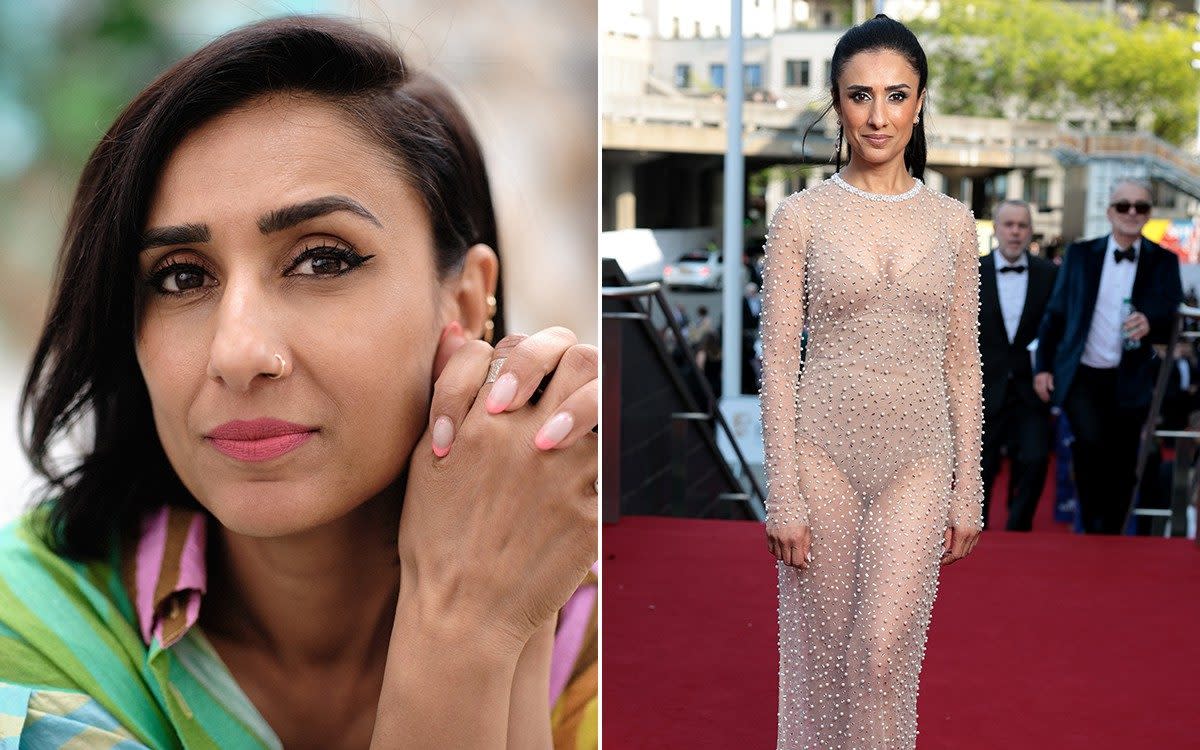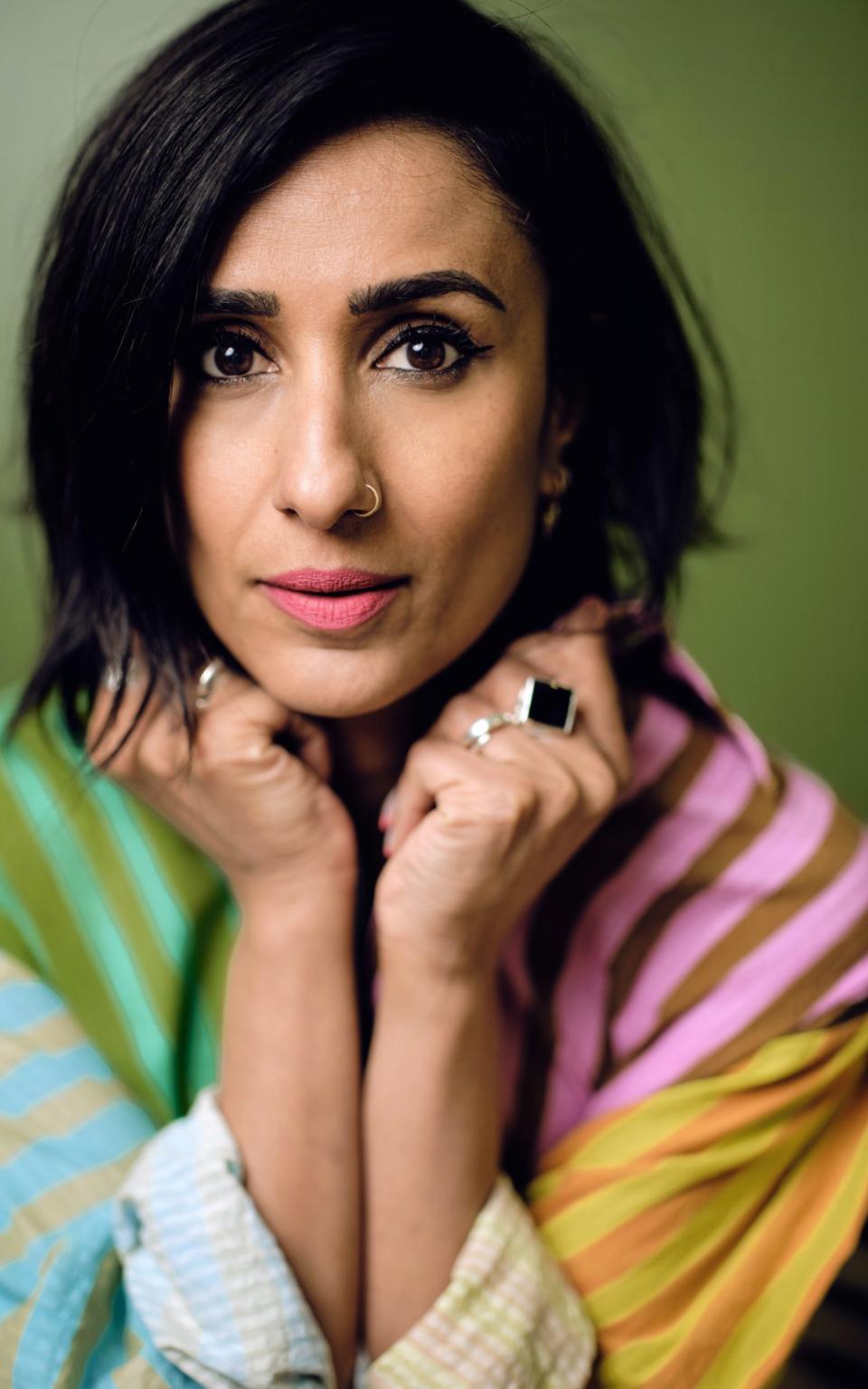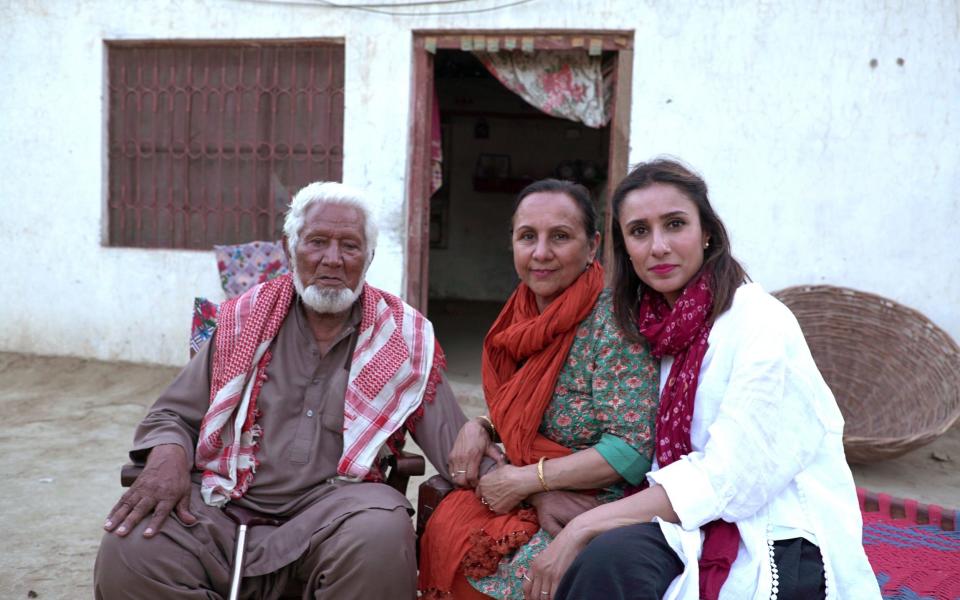Anita Rani interview: ‘An Asian woman wearing a revealing dress has blown people’s minds’

- Oops!Something went wrong.Please try again later.

Could anything be less sisterly than one Woman’s Hour presenter accusing another of dressing like a porn star? Yet that’s where we are after Anita Rani – a current host of the Radio 4 show – went to the Baftas in a see-through gown. She was wearing sturdy underwear, which porn stars don’t tend to do. But it was too much for Dame Jeni Murray, the former doyenne of Woman’s Hour, who wrote a scorching column for the Daily Mail expressing her disapproval.
“Women who have achieved the standing Anita now rightly enjoys should forget about dressing like porn stars or wearing risque outfits to attract the attention of men. It isn’t attractive,” she declared. Those sorts of dresses are fine for pop stars such as Rita Ora, Dame Jeni opined, but “she doesn’t have to worry about her reputation as a thinker. Anita, I’m afraid, does.” She reminded her successor that Woman’s Hour presenters must hold “to the feminist principle that women must be seen to be valued for their minds”. Ouch.
Meeting Rani days after this column appeared, I ask if she read it. “Of course I saw the piece,” she says. “What was her argument – that Rita Ora can get away with it because no one expects her to have a brain? I think it’s a very reductive and quite a strange argument.
“I feel the world has moved on and women can be whatever they want to be, and how amazing is it that you can have a brain and wear sexy clothes?
“I guess it’s about power, isn’t it? People fear a powerful woman, and a woman who can embody everything is terrifying.” But surely you wouldn’t expect a former Woman’s Hour presenter to feel that way? “No,” Rani says, raising an eyebrow then arranging her face into an expression of sympathy. “Which is why I’m slightly concerned. I hope she’s all right.”

Rani, 47, has always been one of life’s people pleasers, and a few years ago she might have adopted a more mollifying approach. But things have changed. Her last word on Dame Jeni’s intervention is this: “I’ve had a lifetime of people trying to shame me and I won’t be shamed any more.
“I’ve always known that women are the foot soldiers of the patriarchy. We need to break the cycle and break free of the conditioning.”
She will talk about that “shame” later. But there is a glowing confidence about Rani these days. She walks into the cafe near her home in London Fields, Hackney, in a bold and bright striped shirt, radiating positive energy. It has been a busy week. She presented the BBC’s D-Day coverage from Portsmouth and hosted a poetry slam event at the Roundhouse in Camden, in addition to her Woman’s Hour duties. “I like to be busy. I didn’t move to London not to be busy,” she shrugs.
Rani has always been a grafter, from her days as a schoolgirl in Bradford. Aged 14, when not studying or stacking shelves in a family friend’s supermarket, she had a job at the local Sunrise Radio station. She inherited her work ethic from her parents, Bal and Lucky, who built their clothes manufacturing business from scratch and put their hearts and souls into it, spending their weekdays in the factory and their weekends as market traders – often with Rani and her younger brother helping out. One of the chapters in Rani’s 2021 memoir, The Right Sort of Girl, is titled: Half-Ar–ing a Job Is Not in Your DNA.
She began her TV career with an unpaid placement at the BBC while studying for a degree in broadcasting before landing her first proper job post-university as a junior researcher on Top of the Pops. From there she moved in front of the camera and put in the years as a jobbing presenter, covering music, sport and entertainment.
Steadily, the jobs got better. In 2008, she became a roving reporter on The One Show and a co-host of Watchdog. By 2011, she had impressed BBC bosses enough to be hired as one of the team covering the wedding of the Prince and Princess of Wales, the first of many royal assignments. “My mum jokes, ‘Oh, she’s like one of the family. She gets invited to all the royal events – she’s been to both weddings, the Coronation, the Jubilee…’.”
Her profile grew further in 2015 when she joined Countryfile and made it to the semi-finals of Strictly Come Dancing. But while she claimed in interviews during that period that, if there were barriers in her career, “I just choose not to see them or let them worry me”, these days her attitude is different.
You might think that there would be no overt racism in the right-on, metropolitan world of TV. Rani thought so too, until a few years ago when someone she was working with called her a “P—” during a night socialising with colleagues. “It would shock you if I tell you who it was, but I’m not going to,” she says.
“It was meant to be a joke. It wasn’t funny. I felt humiliated,” she recalls. “I don’t think there’s any sort of context where it’s all right to use that.” Nobody else in the group pulled him up on it, which was hurtful. “It spun me out for a long time.” But Rani said nothing either. “And that is probably the most poignant thing,” she winces. “Because that was the point where I started to properly self-reflect and think, who the hell am I? I thought I was this ballsy, outspoken, no-nonsense defender of what’s right.
“If I ever see anything racist going down or anything happening around me, I step in and I defend people, I call it out. And when it happened to me, I reverted to being a seven-year-old and I didn’t say anything.
“He’s an idiot. Whatever. He made a mistake. It was more my lack of reaction – I just felt disgusted with myself, and that was even worse.
“However,” she adds, with a glint in her eye, “the game has changed.” The story has a postscript. “It was resolved. I got the power back. Because two years later I talked to them. I brought it up. Oh, it felt great. I just said, ‘Listen, this was said.’ And it was dealt with.” Did he even remember saying it? “No.”
She reflects now: “It shocked me. But it’s great, because it changed me. It made me do some proper, deep self-analysis. Like, what am I worried about? What am I afraid of?”

Now she talks proudly about her heritage. She wore a sari on the Mall to present the Platinum Jubilee celebrations. She has written a novel, Baby Does A Runner, about a woman a little bit like herself, because “you’ve never seen a flawed, messy, multi-faceted South Asian woman in a novel or a film or a TV series. We’re just not.” And she is wondering out loud if the colour of her skin – and her departure from the stereotype of Asian girls as “clever, trusted, safe, maybe boring” – was behind some of the criticism of her Bafta dress.
“It’s really weird, because I’m not the first woman to have worn a dress, but for some reason me in that dress seemed really interesting,” she muses. Well, it was quite eye-catching, I venture. “Yeah, it was, but loads of women wear revealing, sexy dresses on the red carpet,” she retorts.
Is it because people didn’t see her in that light before, but as nice Anita in her Countryfile waxed jacket and wellies? “I wonder if people did even see me,” she replies. “It’s not that I’m being noticed – they’re just flippin’ seeing me for the first time. I think: is it something about the fact that it’s my body in that dress? That it’s an Indian woman who has done something totally unexpected? I’ve done something which is perfectly normal for a woman to do, but there’s something about an Asian woman doing it that has slightly blown people’s minds? I don’t know.”
She felt fearless in the dress, and she doesn’t care what anyone else thinks, because Rani is now a single, child-free woman who is pleasing herself. Last year she split from her husband of 14 years, tech company boss Bhupi Rehal, whom she met at an east London rave. She left their home and moved into a nearby flat she already owned, which she has decorated in the style of a “Parisienne dream house”. You will see from Rani’s regular Instagram posts that she’s now living her best life.
“I get a lot of nice messages from people telling me how they can see me changing and feeling freer,” she says. “And somebody did say to me, ‘There might be a rush on divorces in the Punjabi community, Anita, now that you’ve got divorced.’ Within the South Asian community there is a lot more pressure to stay in marriages.” This notwithstanding, her parents were forward-thinking and not typically strict Asian parents; her dad moved to the UK when he was four “so he was a real Yorkshireman”.
She does not want to discuss the marriage split, out of respect for her ex. But she is happy to talk about coming out the other side. “Divorce is not easy. Separation is not easy. Life change isn’t easy,” she says. But “it was when I realised I was feeling a bit sad that I realised I needed to do something about my life. Because I’m a very upbeat person. Actually, I’m quite good at tackling life. And I’m all right. I’m kind of having a good time right now!”
The decision to go it alone is part of what she calls her “awakening”. Travelling to India to learn about her family history in a 2016 episode of the BBC’s Who Do You Think You Are? was important in that. She uncovered a horrifying story about the fate of her Sikh grandfather’s first wife. When the family’s village in the Punjab came under threat during the violence of partition, the women and girls threw themselves to their deaths at the bottom of a well, or stepped forward to be beheaded by their own relatives, rather than face the “dishonour” of being forcibly taken by Muslim men.

“I connected to my roots in a profound way when I found out what happened to the women in the Punjab. I don’t know what intergenerational trauma is but I felt it. I felt it in my gut,” she says.
“And from that moment I just thought, ‘I’ve got choice’. I’m probably the first woman in my entire lineage of women to have choice in my life. I don’t have to live according to anyone’s rules. But I didn’t figure that out later, until last year.”
And Rani is embracing midlife. Certainly, she has never looked better, from her perfectly made-up face to the sharp haircut (courtesy of her hairdresser around the corner in Broadway Market). In her 20s and 30s, she was too self-conscious even to wear a bikini on the beach, but a couple of years ago she had a word with herself.
“I remember feeling that 45 was a really definitive age, and at what age was I going to just wake up and be relaxed? Was I going to wake up every morning and go, ‘Oh, I can’t do this, I can’t wear that’? I was sort of exhausted by my own internal dialogue, where I was just down on myself all the time.”
On a recent solo spa holiday she wore a swimming costume and realised that nobody else cared. “Everybody is too busy worrying about their own inner thighs.” She felt the same way about the Bafta dress when her stylist, Krishan Parmar, presented it to her. “In the past I might have gone, ‘Absolutely no way.’ But I put it on and just did not feel self-conscious. I just really loved it and thought, ‘Why not? Who cares what anyone thinks?’
“I like this age. I feel really empowered. Also, I’m really looking forward to my 50s because if we’re going to age like J-Lo, or Cerys Matthews – I was with Cerys yesterday, she’s amazing – or Davina, or Claudia, well, they’re making the 50s look flippin’ really sexy, so bring it on!”

The new Anita isn’t afraid to say what she wants career-wise either. BBC bosses must surely be considering her as a future presenter of Strictly or other big ticket shows. “When I got the call to ask if I would do something for D-Day, I presumed I would be reporting as I always do. But I was presenting, which was nice. Before, I was constantly pushing; now I finally feel like I’ve moved on to the next level.”
She has plenty of ideas of her own. “I’d like to do loads of stuff. Maybe a talk show. Or it’d be nice to have my own series, I’ve not had one of those yet. Something about transformation – on women and their new lease of life. Don’t you think there’s a whole generation of us doing it? Something’s happened.
“I tell you what I want to do – I want a nice little music radio show. I love Radio 2. 6 Music is my spiritual home, but I do a lot of cover on Radio 2. That’d be nice in the mix, a nice little joyful place.”
And she would like to adapt her novel for television, with Ambika Mod – recently seen in the Netflix hit One Day – in the lead role. “I interviewed her on Woman’s Hour and – this is what I love about the next generation: she is so empowered and has the confidence to say, ‘I’m not going to take roles as the Asian mate, I’m waiting for the role as the Asian main part.’ So I thought, all right, I’m going to write it for you, babe.”
In addition to her broadcasting work, she recently became vice-chancellor of Bradford University, and is fund-raising for four Rani Scholarships – awarded to four girls each year, two of them from Bradford. She is passionate about the initiative and the subject of social mobility. The only time that Rani shows a hint of defensiveness is when I say how busy her schedule appears and wonder how she manages to fit it all in. “I think you’ll find other people are busier. I don’t know if Paddy McGuinness gets asked this question. Does Romesh [Ranganathan] get asked? I think Romesh is a lot busier than I am.” For the record, it would be the first question I would ask both of those people, but before I can say this she assures me: “I do a bit of Countryfile and Woman’s Hour. And a show for Channel 4. There’s plenty of space for me to do more.”

Does she still love Countryfile? “I don’t do it as much [but] I love it when I’m out and about. It’s an amazing programme to work on because it’s so loved. It’s opened my eyes to a lot of things and I get to see a lot of the country. I’m quite outdoorsy.” Not that everyone spots that.
“Somebody once said to me when I was filming, ‘Oh, we can tell you’re a townie because of your nails.” (Today she boasts an immaculate manicure with orange tips.) “I live in London, but I access the countryside as a city dweller. It’s mad that we talk about it like it’s two separate things – we’re a tiny island and you only have to drive out in any direction and you find a patch of countryside. I don’t think there’s that much of a divide between country folk and urban folk.”
She adores Woman’s Hour, and as someone who spent her teenage years in her bedroom reading NME cover to cover, she’s thrilled to be taking the show to Glastonbury this month. “Sixteen-year-old me is losing her mind,” she grins. “And it’s brilliant because it just feels like it has put Woman’s Hour in a space where it belongs. The argument before was: does it even need to exist? Never has it been more important. And not only that, but we’re representing a whole new generation. Young women are coming to us, and not necessarily via Radio 4 – they’re finding us through social media, the podcast or Instagram.”
Rani has settled into Woman’s Hour, she says, just as she seems to have settled into this new phase of her life. She admits: “I was terrified when I first got the job. But I’m going to stop saying that because now I feel I’ve found my groove.”
Baby Does a Runner is out now in paperback, (Zaffre, £9.99). Also available in audio and eBook

